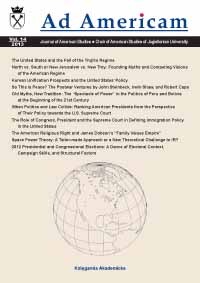Korean Unification Prospects and the United States’ Policy
Korean Unification Prospects and the United States’ Policy
Author(s): Marcin GrabowskiSubject(s): Politics / Political Sciences
Published by: KSIĘGARNIA AKADEMICKA Sp. z o.o.
Summary/Abstract: Korean unification seemed a conceivable prospect at the turn of the century, especially after the Inter‑Korean summit in 2000. This is not the case nowadays, however, in light of the provocative behavior of the North Korean regime in 2010, 2012 and 2013 (especially the declarations made in March 2013). Since such an option seems likely in the future, U.S. foreign policy‑makers should analyze possible scenarios for Korean integration and its influence on the regional system. The costs of such an endeavor are hard to estimate, although using German unification for comparison, we may expect that such a process could ruin the economies of both Koreas, as well as the socio‑political systems of both countries. There are even greater doubts concerning whether there is any actor in the regional scene that could support Korean unification. As for the main regional players – China, Japan and the United States – such a change would be a serious challenge. This is why it is important to focus on the German example in order to strengthen the regional trust and alliance system. The main goal of this paper is to analyze the crucial Northeast Asian challenge of American foreign policy, present the possibilities of Korean unification, assess its costs, use German unification as a point of comparison, and assess the possible influence of Korean unification on the regional system and the approaches of regional powers towards the process of creating a New Korea.
Journal: Ad Americam. Journal of American Studies
- Issue Year: 2013
- Issue No: 14
- Page Range: 37-49
- Page Count: 13
- Language: English

